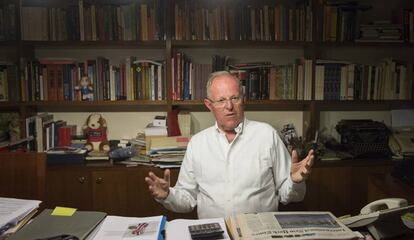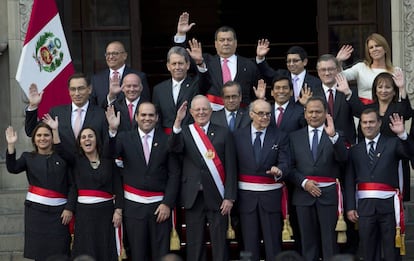“Peru needs a social revolution: this country is very backward”
President Pedro Pablo Kuczynski gives his first interview after taking office to El País

If Peru’s sustained economic growth over the last 16 years has made it an exception within Latin America, no less remarkable was the victory in June’s presidential elections of Pedro Pablo Kuczynski, a 77-year-old intellectual heavyweight who stands out among past and present regional leaders.
Educated at Oxford and Princeton, PPK, as he his known in the Andean nation, was educated at Oxford and Princeton, has been a World Bank economist, a former prime minister, twice exiled – once during the military dictatorship of the late 1960s, and again under Alberto Fujimori during the 1990s – Kuczynski beat his rival, Fujimori’s daughter Keiko by just 39,000 votes.
His father was a Jewish doctor who fled Nazi Germany, settling in Peru, where he became a specialist in tropical diseases and set up the San Pablo leprosy clinic, and where, in the 1950s, a young Che Guevara would work as a volunteer. Kuczynski’s mother, a Swiss-born music and literature teacher, was the aunt of filmmaker Jean Luc-Godard.
Kuczynski, who took office on July 28, has agreed to give his first interview as president to EL PAÍS. The conversation takes place in the office of his home in the upscale San Isidro neighborhood in Lima. Calculator in hand, the president explains his vision for Peru.
Question. Peru’s economy has been growing at around 4%, above the regional average, reducing poverty by half over the last decade. Nevertheless, there is widespread discontent, which, enflamed by corruption and crime almost saw the authoritarian populism of your rival Keiko Fujimori win. Why?
Answer. Part of the problem is the country’s success. While it’s true that povery has fallen to around 23% of the population, that’s still an awful lot of people: almost 7.5 million people, about the same number as those without household running water. Another reason is that previous governments have not taken the needs of these people seriously. Furthermore, there is a widespread perception about the more educated sectors of Peruvian society that corruption is widespread and unpunished, to which we also need to add the economic downturn of recent years.

Q. Yours will be a minority administration. Out of Congress’s 130 seats, your party, Peruvians for Change, only has 18 seats, compared to the left’s 21 and the 73 of Keiko Fujimori’s Popular Force. Will you be able to work with Fujimori?
A. Not all of the 73 deputies sitting with Fujimori are members of her party: around 30 jumped on the bandwagon believing she would win and that they would be rewarded. We have to find a way to attract some of them, otherwise it will be difficult to get anything done in Congress once the honeymoon period is over. But I’m not expecting a lot of support, simply that they will be tolerant and neutral.
Q. Are you going to release Alberto Fujimori from jail?
A. If Congress passes a law that would allow him to finish his sentence at home, I would sign it, but I’m not going to pardon him.
Q. Are there any aspects of economic policy you share with Fujimori?
A. They are opposed to lowering VAT, but we need to do that because it’s a direct tax that hits the poorest hardest. High sales tax encourages people to work outside the economy, which is the case with about 60% of the workforce. The black economy means no investment in modernizing. It’s like the analogy of the broom and the vacuum cleaner: why should I buy a machine to clean the streets when I have heaps of women with brooms that I pay buttons to? This is why Peru needs to change direction.
Q. The support of Verónika Mendoza’s Broad Front was key to your win. Do you think you’ll be able to work with the left?
A. What separates the left and the right in Peru is the issue of the mining sector. I believe it has to be industrialized. To work with the Broad Front and bring it toward a more moderate position, we need to work on water and education. How is it possible that so many people still don’t have access to running water or that our schools are falling apart? Fixing this is not about left or right, but common sense.
Q. You have promised a social revolution. Where do you intend to start?
A. We want to start a social revolution: this country is very backward. Business leaders still talk about cholos [a disparaging term for the working class, mainly ethnically Andean]. They are living in the nineteenth century. Water and health are our priorities. The program to provide water to Peruvians should generate half a million jobs.
Sign up for our newsletter
EL PAÍS English Edition has launched a weekly newsletter. Sign up today to receive a selection of our best stories in your inbox every Saturday morning. For full details about how to subscribe, click here
Q. How are you going to reactivate the economy?
A. By getting the 10 or 15 big projects that have been held up going. That would mean extra annual growth of 1.5% GDP.
Q. How do you see Peru in the context of Latin America? What should it be doing about the crisis in Venezuela?
A. Peru is punching below its weight internationally. In the case of Venezuela, we need to bring together the region’s presidents, as happened in Central America in the 1980s.
Q. How would you define yourself in political terms?
A. We need to look for centrist solutions: putting the emphasis on welfare, which we are behind in, health, water, education, at the same time, we need a market economy to finance this.
English version by Nick Lyne.
Tu suscripción se está usando en otro dispositivo
¿Quieres añadir otro usuario a tu suscripción?
Si continúas leyendo en este dispositivo, no se podrá leer en el otro.
FlechaTu suscripción se está usando en otro dispositivo y solo puedes acceder a EL PAÍS desde un dispositivo a la vez.
Si quieres compartir tu cuenta, cambia tu suscripción a la modalidad Premium, así podrás añadir otro usuario. Cada uno accederá con su propia cuenta de email, lo que os permitirá personalizar vuestra experiencia en EL PAÍS.
¿Tienes una suscripción de empresa? Accede aquí para contratar más cuentas.
En el caso de no saber quién está usando tu cuenta, te recomendamos cambiar tu contraseña aquí.
Si decides continuar compartiendo tu cuenta, este mensaje se mostrará en tu dispositivo y en el de la otra persona que está usando tu cuenta de forma indefinida, afectando a tu experiencia de lectura. Puedes consultar aquí los términos y condiciones de la suscripción digital.








































